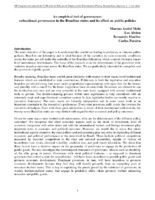An empirical test of governance: subnational governance in the Brazilian states and its effect on public policies
Fecha
2008-11Autor
Melo, Marcus André Barreto Campelo de
Alston, Lee J.
Mueller, Bernardo
Pereira, Carlos
Metadatos
Mostrar el registro completo del ítemResumen
The concept of sub-national governance has been widely discussed in the literature but few empirical evaluations are available other than case studies. The paper presents the findings from a comparative empirical study of governance aimed at assessing how state institutions affect policy outcomes such as education and health, as well as administrative efficiency and corruption. The focus of the research is on the determinants of the perceived wide variation in policy outcomes across the Brazilian states. Why are some states better capable to promote economic development while others stagnate? Why some states exhibit good capacity for policy coordination and adaptability whereas other states are characterized by policy inertia and predatory politics? Why some state governments are able to provide public goods such as a professionalized bureaucracy and adequate health and education services but other state governments tend to specialize in the provision of private goods such as public sector jobs and targeted transfers to specific clienteles? Why corruption is more prevalent in some states than in others? Why some states are more efficient in the provision of goods and service than others A variety of proxies for the quality of political institutions - including regulatory, control and political institutions - are used in the estimation which is based on panel data modeling.


